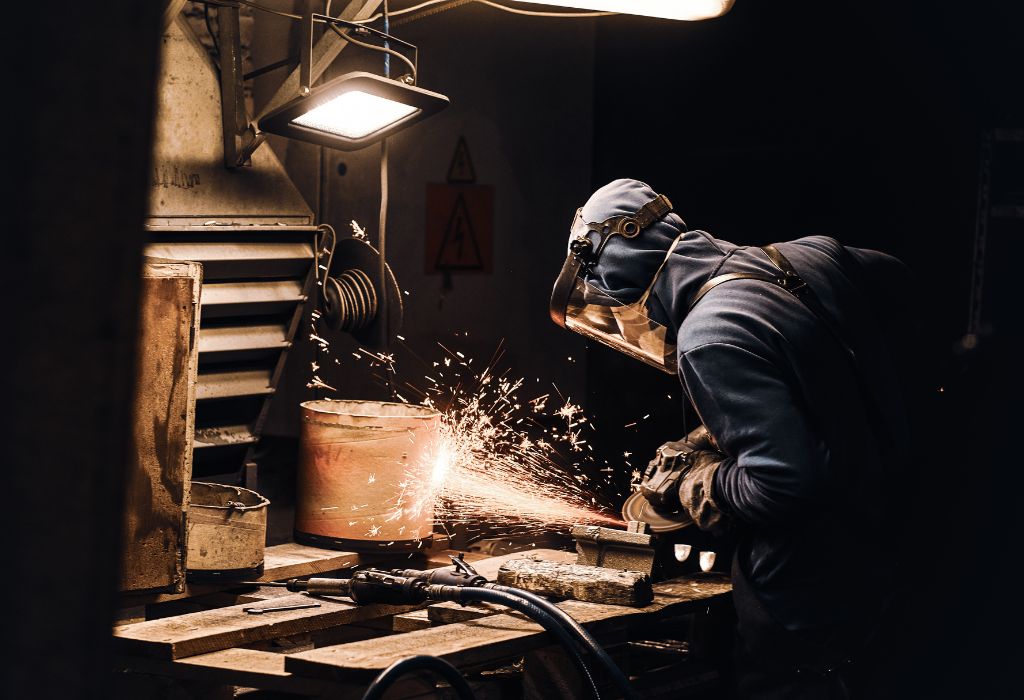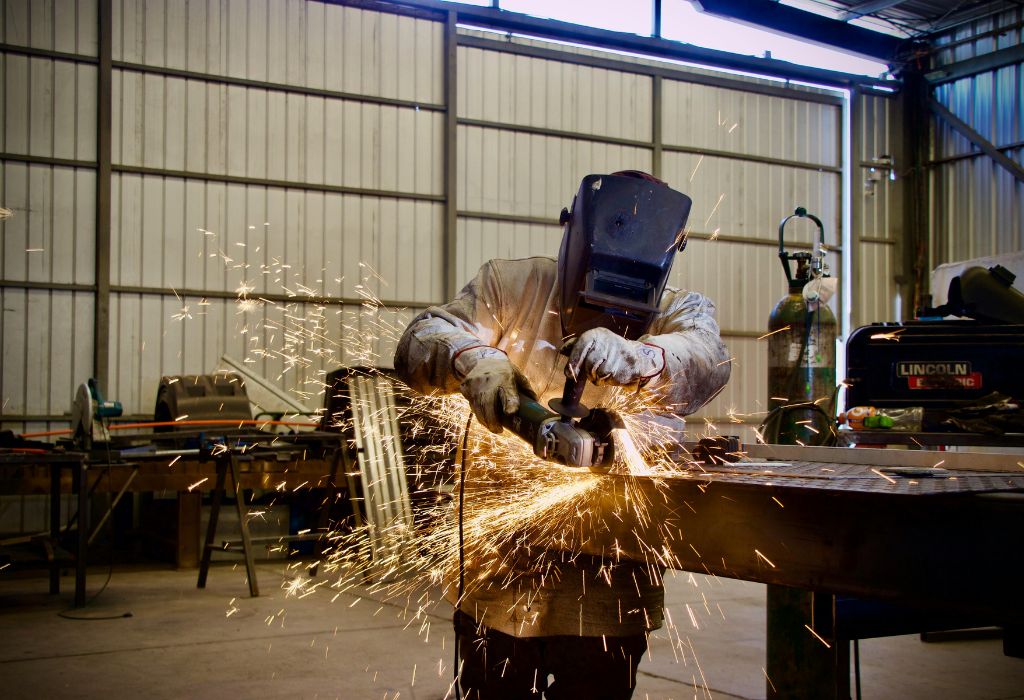Picture a high school graduate in Pennsylvania searching for a career that offers stability, good pay, and practical skills.
Instead of pursuing a four-year degree, they consider welding, a trade in high demand across the state.
This choice could open doors to opportunities in construction, energy, and manufacturing.
Welding is more than just joining metals together. It is a skilled profession that requires precision, training, and certification. In Pennsylvania, welders are needed for infrastructure projects, pipelines, and factories that keep the state’s economy moving forward
. For those willing to learn, the pathway to a welding career is both achievable and rewarding.
The demand for welders is projected to grow steadily. According to the U.S. Bureau of Labor Statistics, welding jobs are expected to increase by 8% nationwide through 2030 (BLS).
In Pennsylvania, welders can earn between $48,000 and $60,000 per year, with specialized roles paying even more.
What makes welding appealing is the balance of hands-on work, job stability, and advancement potential.
Whether through trade schools, apprenticeships, or union training, aspiring welders in PA have multiple paths to success.
This guide explains every step, from education and training to certifications, salaries, and career outlook. By the end, readers will have a clear roadmap on how to become a welder in PA and build a secure future in this vital trade.
What Does a Welder Do?
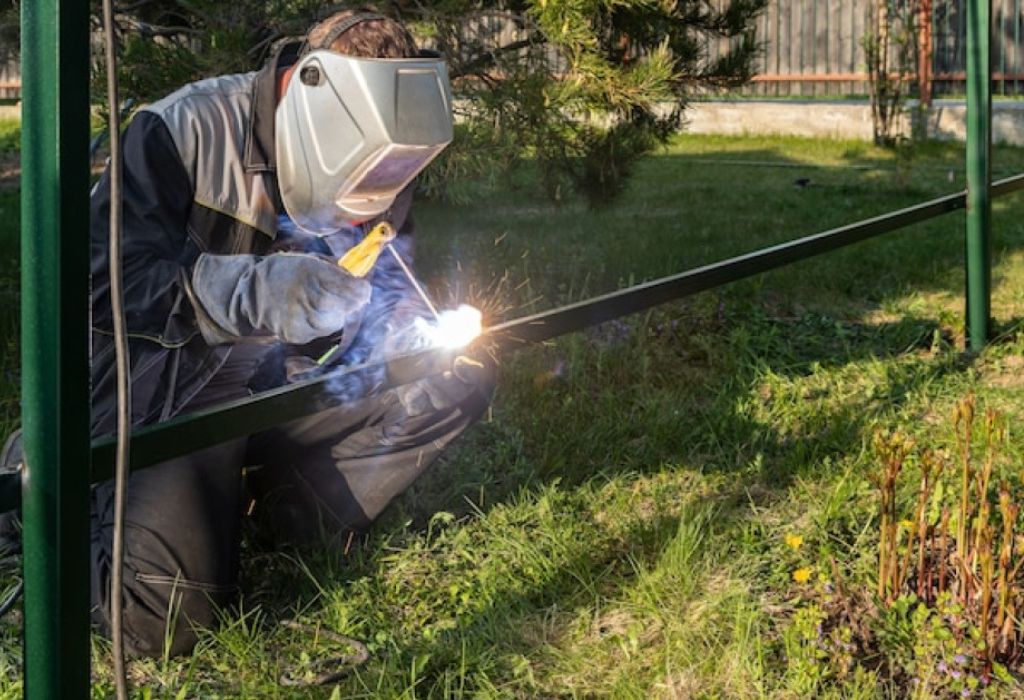
A welder is a skilled tradesperson who joins metal parts using heat and pressure. The role requires technical precision, safety awareness, and the ability to work with various welding methods depending on the project.
In Pennsylvania, welders play a vital role in industries such as construction, shipbuilding, pipelines, and manufacturing. Their work keeps infrastructure strong, factories running, and energy systems reliable.
Welders in PA may spend their days reading blueprints, preparing metal surfaces, setting up welding equipment, and ensuring that joints meet strict safety and quality standards. It is a profession that combines craftsmanship with technical skill.
What skills do welders need?
Welders must have strong hand-eye coordination, attention to detail, and a solid understanding of safety practices.
What industries hire welders in PA?
Key industries include construction, energy, shipbuilding, pipelines, and manufacturing.
Is welding a good career in PA?
Yes, welding is in high demand and offers competitive wages compared to many other trades.
What tools do welders use?
Common tools include welding torches, grinders, clamps, protective equipment, and measuring devices.
Do welders need to travel for work in PA?
Some jobs are local, while others, like pipeline and construction projects, may require travel.
Why Welding Is in Demand in Pennsylvania
Pennsylvania has a long history of steel, construction, and energy production. Welders continue to play a critical role in these industries, ensuring that pipelines, bridges, and manufacturing plants remain safe and efficient.
The demand for welders in PA is driven by ongoing infrastructure projects and industrial growth. From urban development in Philadelphia and Pittsburgh to energy pipelines in rural areas, welding remains a trade in constant need.
According to CareerOneStop, more than 17,000 welders are currently employed in Pennsylvania, making it one of the strongest welding job markets in the United States (CareerOneStop). This number is expected to remain steady or grow as older welders retire and new projects begin.
For many, welding is attractive not only for job availability but also for its competitive wages. Welders in PA often earn above the national median, especially those working in specialized fields such as pipe welding or union jobs.
What is driving welding demand in PA?
Large-scale infrastructure projects, ongoing manufacturing, and energy sector expansion.
How many welders are employed in PA?
Over 17,000 welders work across the state.
Are welding jobs stable in PA?
Yes, welding is considered one of the most stable trades, with consistent demand.
Do welders in PA earn good wages?
Average salaries range from $48,000 to $60,000, with specialized jobs paying more.
Is there union work for welders in PA?
Yes, unions such as the Ironworkers and Steamfitters provide training and strong job security.
Education Requirements to Become a Welder in PA
To become a welder in Pennsylvania, most employers expect a high school diploma or GED. Basic education ensures that future welders have the math, reading, and problem-solving skills necessary for technical training.
Certain high schools and vocational programs in PA already offer welding-related classes, including shop, blueprint reading, and mechanical courses. These classes give students a head start before entering a welding training program.
Although welding is a hands-on trade, formal education is still an important first step. Community colleges, technical schools, and trade programs across Pennsylvania provide structured welding instruction that combines classroom learning with practical training.
Training programs vary in length. Some certificate courses last only six months, while associate degree programs can take up to two years. Choosing the right option depends on a student’s career goals and the type of welding work they want to pursue.
Do you need a diploma to be a welder in PA?
Yes, most employers require at least a high school diploma or GED.
What classes help prepare for welding?
Math, blueprint reading, shop, and mechanical courses are the most useful.
Can welding be self-taught in PA?
Basic techniques can be learned, but certification requires formal training.
How long does welding school take in PA?
Programs range from six months to two years, depending on the level of study.
Is financial aid available for welding students in PA?
Yes, many trade schools and community colleges offer scholarships, grants, and financial aid packages.
Training Programs and Welding Schools in PA
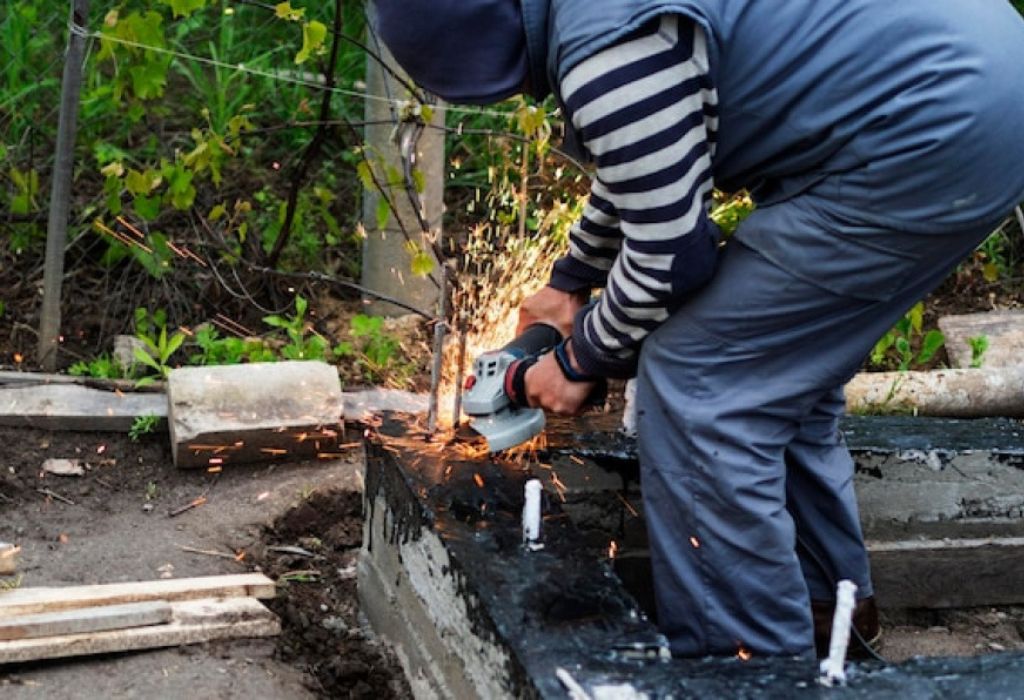
Pennsylvania offers a wide range of training programs for aspiring welders. These programs are available at trade schools, community colleges, and specialized technical institutes. Training combines classroom instruction with hands-on practice, preparing students for certification and entry-level jobs.
Some of the most recognized welding schools in Pennsylvania include Pennsylvania College of Technology, Triangle Tech, and Community College of Allegheny County. Many local vocational-technical schools across the state also provide affordable welding programs.
Apprenticeships are another pathway into welding. Sponsored by unions and employers, apprenticeships offer paid, on-the-job training alongside classroom learning. This option is ideal for those who want to earn while gaining practical skills.
While most welding training must be hands-on, some schools offer blended learning models where theoretical coursework can be completed online. This flexibility makes welding education more accessible to working adults.
The cost of welding programs in Pennsylvania varies, with tuition typically ranging from $5,000 to $15,000, depending on program length and certification goals. Financial aid, scholarships, and union sponsorships can help offset these costs.
What are the top welding schools in PA?
Examples include Pennsylvania College of Technology, Triangle Tech, and Community College of Allegheny County.
Do apprenticeships exist for welders in PA?
Yes, unions and employers offer apprenticeship programs with paid training.
Is hands-on training included in PA welding schools?
Yes, practical shop experience is a required part of every program.
Can training be done online?
Some theory can be studied online, but welding requires in-person practice.
What is the cost of welding training in PA?
Tuition averages between $5,000 and $15,000 depending on the program.
Certifications Needed for Welders in PA
To work as a welder in Pennsylvania, most employers require certification. The most recognized credential is through the American Welding Society (AWS), which verifies a welder’s ability to perform specific welds under industry standards.
AWS certification involves both written and hands-on exams. Welders demonstrate their skill on test plates or pipes, which are then inspected to meet safety and quality guidelines. Passing this test ensures that welders are qualified for a wide range of professional jobs.
Some welding jobs in Pennsylvania, particularly in construction and industrial sectors, may also require state or union-specific certifications. These certifications ensure compliance with safety codes and project requirements.
Certification is not always legally mandatory, but it dramatically increases job opportunities and pay. Employers prefer certified welders because certification proves competence, reliability, and safety awareness.
Costs for certification vary but usually range from $200 to $1,000 depending on the type of test and location. Many trade schools in PA include AWS certification testing as part of their programs.
Do welders need certification in PA?
Yes, most employers require AWS or equivalent certifications for employment.
What is AWS certification?
It is a standardized credential from the American Welding Society proving skill in specific welding techniques.
How do you get certified as a welder in PA?
By completing training, passing hands-on tests, and meeting AWS or state-level standards.
Is certification mandatory for all welding jobs?
Not for every position, but it is required for structural, industrial, and union jobs.
How much does welding certification cost in PA?
Fees typically range from $200 to $1,000, depending on the test type.
Steps to Become a Welder in PA
The first step to becoming a welder in Pennsylvania is completing high school or earning a GED. This basic education is essential for math, reading, and problem-solving skills used in welding.
Next, enroll in a welding training program. Pennsylvania offers options at trade schools, community colleges, and technical institutes, where students gain both classroom knowledge and hands-on shop experience.
Many aspiring welders choose apprenticeships. These programs, often run by unions or employers, provide paid on-the-job training while students continue to learn in the classroom.
Once training is complete, the next step is obtaining certification. The most common is AWS certification, which proves a welder’s competence and increases job opportunities.
The final step is applying for jobs. Welders in Pennsylvania can work in construction, manufacturing, pipelines, and energy sectors, with strong demand across the state.
What is the first step to becoming a welder in PA?
Completing high school or earning a GED to meet basic education requirements.
How do apprenticeships help?
They provide paid, hands-on experience while also building skills and industry connections.
When should you apply for certification?
After finishing training and demonstrating proficiency in welding techniques.
Do you need experience before getting hired?
Entry-level jobs are available, but training and certification improve employability.
What’s the final step to becoming a welder in PA?
Securing certification and applying for jobs in industries across the state.
Salary and Career Outlook for Welders in PA
Welders in Pennsylvania enjoy strong earning potential compared to many other skilled trades. The average annual salary for welders in the state falls between $48,000 and $60,000, depending on experience, certifications, and industry.
Specialized welders often earn more. For example, pipe welders, underwater welders, and those working on large infrastructure projects can command significantly higher wages. Union welders may also receive additional benefits such as healthcare and retirement packages.
The job outlook for welders in Pennsylvania remains positive. As older welders retire, new opportunities continue to open, especially in construction and energy sectors. Welding remains one of the most in-demand trades, with steady work projected for the next decade.
What is the average welder salary in PA?
Most welders earn between $48,000 and $60,000 annually.
Do specialized welders earn more in PA?
Yes, those in pipeline, underwater, or union positions often make higher wages.
What is the job outlook for welders in PA?
The outlook is strong, with steady demand expected across multiple industries.
Do welders get benefits in PA?
Many welders receive healthcare, retirement plans, and union benefits.
Where do welders earn the most in PA?
Urban centers such as Pittsburgh and Philadelphia typically offer higher wages.
Tips for Launching a Welding Career in PA
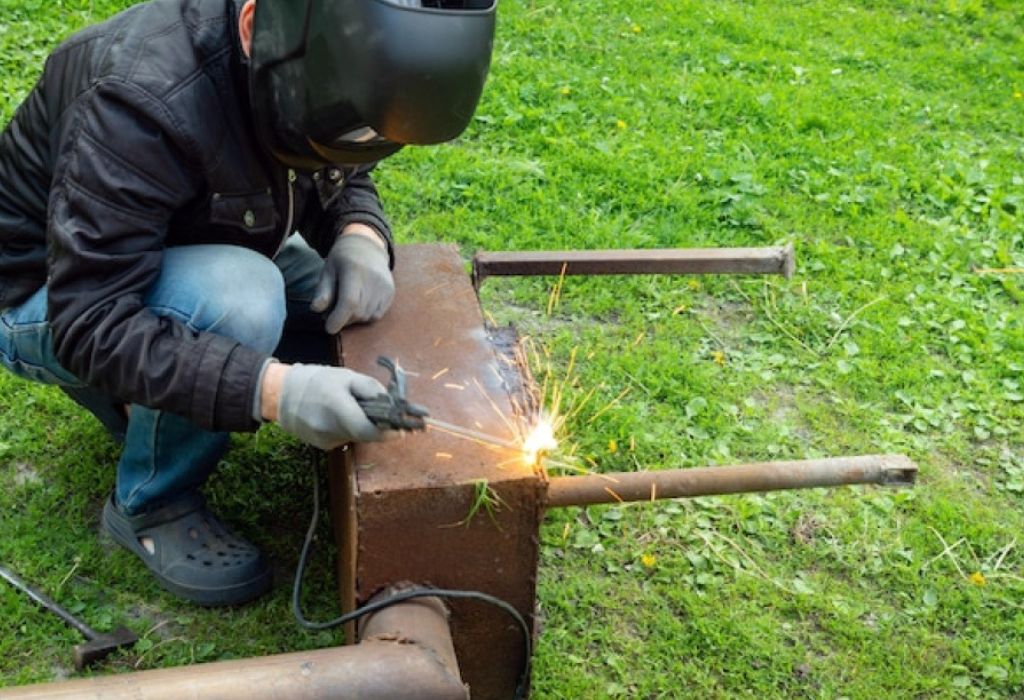
Starting a welding career in Pennsylvania requires more than just training and certification. Success also depends on job searching strategies, networking, and a commitment to safety and skill development.
Beginners should explore apprenticeships and entry-level jobs to build real-world experience. Trade schools often have job placement services, and unions provide reliable pathways to stable, long-term employment.
Safety should always come first. Welders must consistently use protective gear, follow OSHA standards, and practice proper equipment handling to ensure a safe work environment.
Networking is another powerful tool for new welders. Joining professional associations such as the American Welding Society (AWS) or local trade groups helps connect with employers and peers.
With persistence, continuous learning, and the right certifications, welders in Pennsylvania can move into higher-paying, specialized positions and build rewarding careers.
How can beginners find welding jobs in PA?
Through apprenticeships, trade school placement programs, and online job boards.
Do unions help new welders in PA?
Yes, unions provide training, benefits, and job placement opportunities.
What safety practices should new welders follow?
Always wear protective equipment and comply with OSHA safety standards.
Can welders advance their careers in PA?
Yes, advanced certifications and experience can lead to supervisory or specialized roles.
What networking options exist for welders in PA?
Joining AWS chapters, trade associations, and local union events builds connections.
Conclusion
Becoming a welder in Pennsylvania is a clear and rewarding path for those seeking a stable, hands-on career. With opportunities in construction, manufacturing, energy, and infrastructure, welders remain in high demand across the state.
The process begins with basic education, continues through training and certification, and leads to job opportunities that offer competitive wages and long-term stability. Specialized certifications and union memberships can open even greater doors for advancement and higher pay.
Welding is not only about skill but also about dedication to safety, precision, and continuous learning. By following the right steps, aspiring welders in PA can build a career that provides financial security, professional growth, and pride in meaningful work.
For anyone ready to start, the time is now. Explore local trade schools, apprenticeships, or AWS certification programs to take the first step toward a secure future in welding.

I’m Darrell Julian, the founder, lead writer, and hands-on welding enthusiast behind ArcWeldingPro.com. With more than 15 years of real-world welding experience, I created this platform to share what I’ve learned in the field, in the shop, and in the heat of the arc.

